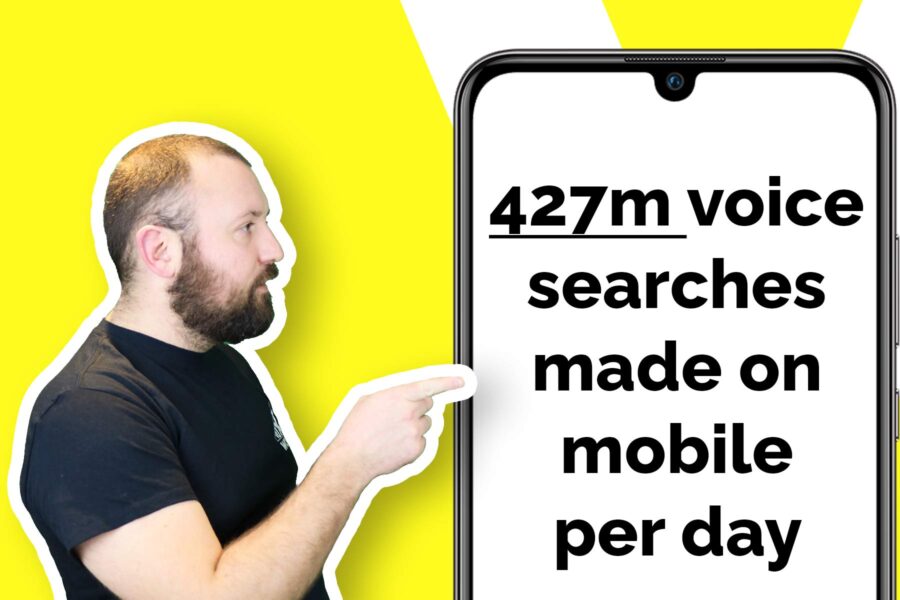With approximately 427m voice searches made on mobile per day, what does it mean for your business? And what can you do to capitalise on it?
Voice search volumes
20% of mobile searches are voice searches, according to Google. That’s approximately 427m voice searches made on mobile every single day.
That’s around 12.8 billion voice searches per month and 153 billion voice searches per year.
And that’s excluding voice searches made on desktop or smart speakers, and excluding voice searches made using Siri, Bixby, Alexa or any other voice assistant. This is purely Google voice searches made on mobile.
Working out voice search numbers
There are many stats out there that profile the state of voice search traffic. So our working out on this isn’t a perfect science, but it’s close enough to give you an idea of the kind of volume of voice searches Google is handling on mobile per day. So here we go:
- It’s estimated that 3.5 billion searches are performed on Google per day
- 61% of those searches are made on mobile. That’s approximately 2.135bn mobile searches per day
- According to Google, 20% of mobile searches are done by voice
- 20% of 2.135bn is 427m voice searches
What do these voice search numbers mean for you?
It means that you could be missing out on a slice of that search traffic. 153 billion opportunities every year to raise awareness, build relationships and convert customers. How do you know that people aren’t asking for information or services that you can provide?
And what about growth? Google searches grow by around 10% every year. Google Assistant has 500m monthly active users and smart speaker sales are forecast to continue to grow at a pace of 21% in 2021.
So it’s not just today’s opportunities you’re missing out on, it’s also the future growth you’ll miss, too.
Should you do something about voice search?
Many companies are in a similar position as they were during the dawn of the internet, when they were debating whether they need a website. Then, with mobile, debating whether to mobile-optimise their websites. Then, it happened with social. Should we be on Twitter? Facebook? Clubhouse?
Most of the time, the answer has proven to be yes. Voice user interfaces allow us to finally control technology, access the internet, get things done and manipulate our environment using just our voice. That won’t go away.
So where do you start when thinking about voice search? How should you plan your activity? And what activity can you actually do to ‘rank’ for voice searches?
Is there a voice search equivalent to keyword research?
Usually, for planning content strategies, you’d start by trying to understand what people need. What people are searching for. With online search, you’d do keyword research.
Regrettably, those facilities and services don’t exist at the moment to profile voice search traffic in the same way.
That means that no one knows specifically what people are searching for with voice, and how often. Nor can you attribute voice searches to website traffic, so if you did rank, and it generated traffic to your website, you wouldn’t know. Tools like SEM Rush just don’t exist for voice.
Why don’t voice search research tools exist?
Google doesn’t release any data concerning voice search queries made through Google Assistant, so there isn’t any data for tools like that to be wrapped around.
That’s likely because voice is considered personally identifiable information (PII) and falls under data protection restrictions. Any sharing of that data with marketers wouldn’t bode well for user confidence. ‘Big tech’ has already been in enough trouble for a lack of privacy when it comes to sharing personal data on voice assistants and I doubt they’d like to go through that again.
Google does, however, share transcribed queries with third party developers who build Google actions for Google Assistant, but that data is confined to the things that people say once inside the third party action. Plus, developers only receive the text transcript of what was said, not the audio.
How do you optimise for voice search?
Given that you can’t do specific voice-related keyword research, and you can’t measure the impact specifically, how are you supposed understand what you should try and ‘rank’ for with voice searches? Then, how do you actually rank? What do you need to do to be the answer that Google reads back?
How to do voice search research
There are a number of data points you can use to gather insights on what people might be searching for, including:
- Traditional keyword research. Although this won’t give you specific voice search queries, it’ll point you in the right direction.
- Website search analysis. The things people type into the search box on your website can be a valuable source of customer insights.
- Customer service insights. People are already having conversations with your company across all channels including phone, email, messenger, social, live chat etc. Harnessing a voice of the customer programme that centralises this data can give you buckets of insights into what customers might be searching for.
How to ‘rank’ for voice searches
There are a number of ways you can ‘rank’ for a voice search, including:
- Using structured data and schema.org markup on your website content to surface news, recipes, podcasts, how-to tutorials, tables, lists, FAQs, specific paragraphs of text and more
- Using app actions to surface app capability through Google Assistant (on Android)
- Using app slices to serve information from your app through Google Assistant (on Android)
- Using ‘speakable markup’ on your website content (beta)
- Creating specific conversational apps by building actions for Google Assistant
- Marking-up YouTube videos to surface natively in Google Assistant (in beta for How-to videos)
- For hardware companies, integrating your products into the Google Smart Home platform
How to measure whether you’re ranking for voice search?
There are a couple of tools that allow you to run analysis to check whether you’re ranking for voice search. Adido has the Share of Voice tool, which is in beta. That does something similar to Bespoken whereby it feeds queries into Google Assistant and measures the responses.
However, tooling in this area is in its infancy and so, often, manual testing is needed to back it up. That can be a little long and drawn out and results can also change over time, as well as vary by geography.
Should I invest in voice search today?
The lack of research and monitoring tooling could be a sign that we’re still in the early days of voice search from an industry and tooling perspective. However, with 427m daily voice searches on mobile, it’s hard to say the same for user adoption.
If we’ve learned anything over the years about how to provide value to customers and build relationships, it’s that we should be where customers are. And when more of your customers are using their voice to access information and services, don’t you think you should be there when they do?





